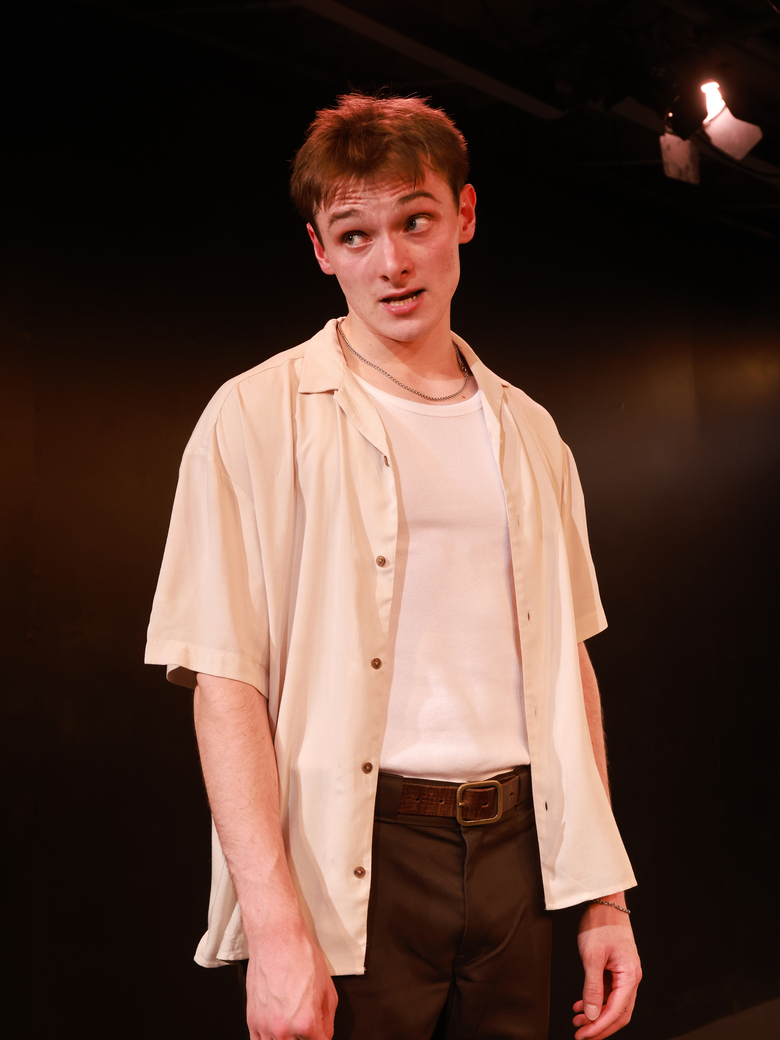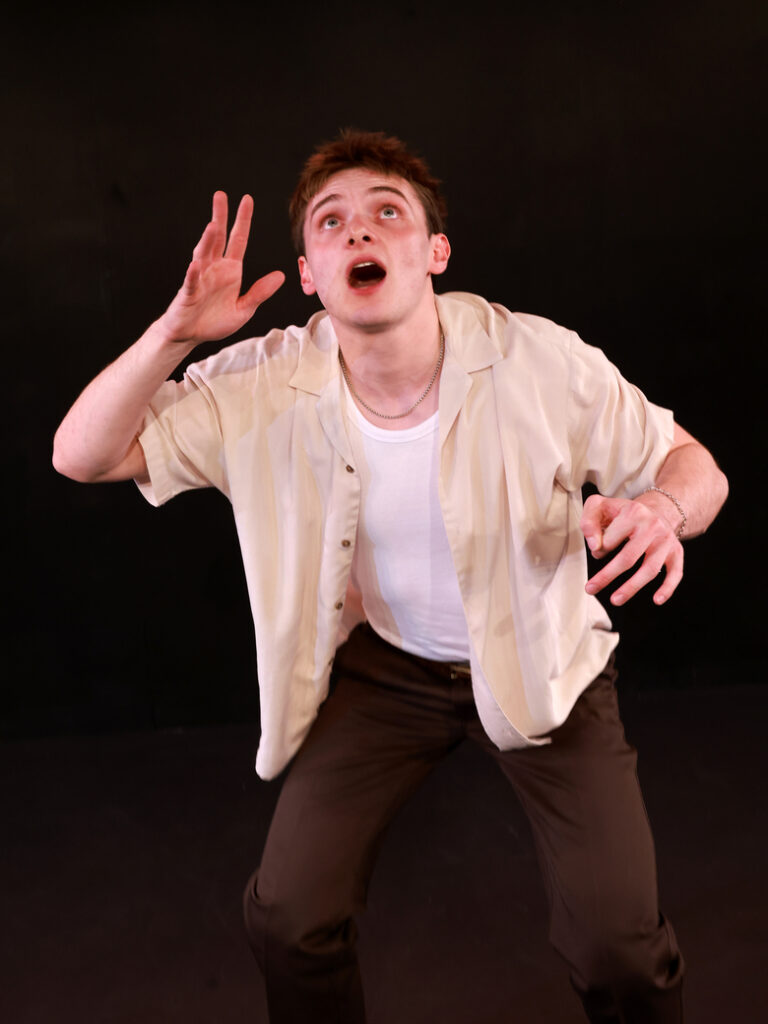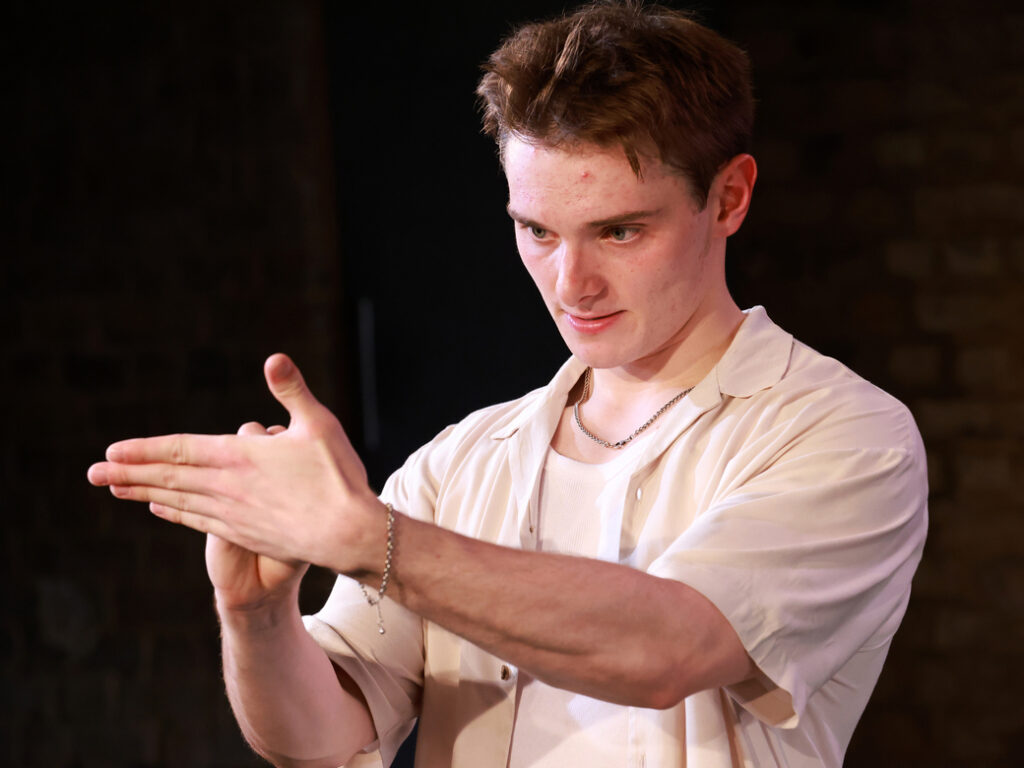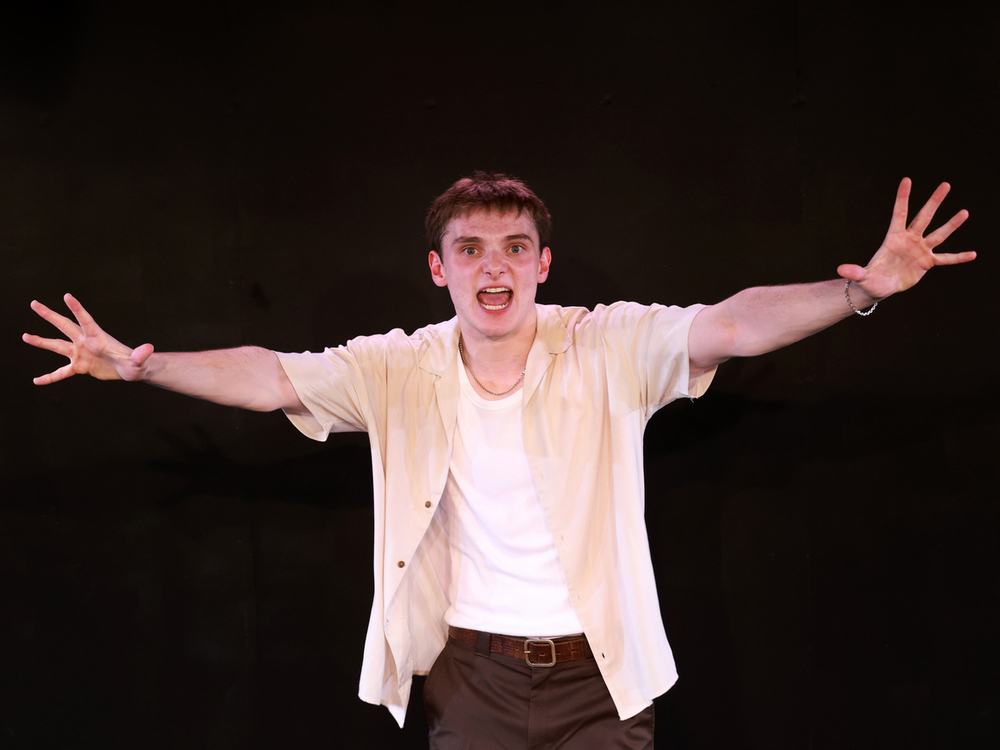Review by Simon Jenner, September 22 2025
*****
“You know Mile End? It’s in the East End” quips Sasha to his knowing audience. Based in Dalston, the Arcola’s proved a recent spiritual (or spirit) home for a couple of Philip Ridley’s London-themed plays. The Poltergeist is revived here after its stunning 2022 run. Initially paired this time with a revival of Ridley’s equally-acclaimed Tarantula whose live premiere took place only this January, The Poltergeist now sadly proceeds alone, after Tarantula was cancelled, due to illness. Directed as before by Wiebke Green and now featuring Louis Davison, The Poltergeist runs at the Arcola Studio 2 till October 11.

Louis Davison. Photo Credit: Simon Anand
This is Philip Ridley, where horror and hilarity collide. Normally that is. The Poltergeist is different. Unlike Tarantula, and like it also first streamed during covid and now twice revived live by Green, there’s no weird, no eerie, no horror. The hunch of human monsters stalking Tarantula for instance, are absent. The Poltergeist is a little bit eponymous. The artist who haunts himself, perhaps. Though even this doesn’t explain why a world-renowned art prodigy at fifteen, the famous clamouring to buy his paintings, is, at twenty-six, living in a cheap flat above a dry-cleaner with his out-of-work actor boyfriend Chet. And no-one can even remember him.
Stripped back into a black backdrop, as best fits this space, designer Kit Hinchcliffe ensures everything depends on the actor. Not even Ciaran Cunningham’s spot-lighting is in evidence. It previously gave a little respite to Tarantula’s actor; yet an immersion, depth and actor-to-lighting synch that rendered that production so breathtaking. Here Cunningham plays a relentless yellow glare. If there were dragons, there’d be nowhere to hide and pounce. Aesthetically that’s congruent with the naked internalising of Sasha. It puts added stress on Davison’s expression: every nuance, flinch and explosion starts from the face and gyrates outwards so Davison flails like a demented pelican.
ADHD-ridden Sasha and calm Irish trainer-actor Chet are invited to a bash. It’s for Sasha’s niece, her fifth birthday party. Sasha’s steroid-smart persona flips knowingly from outwardly-voiced “we’d love to” to fantasising machine-gunning the guests. Edgy hilarity flips in the outrageousness of Sasha’s resentment towards elder brother Flynn, the accountant, and cliche-ridden wife Niamh. They’re guilty of something terrible. Even beyond being walking platitudes.
Because Sasha’s so verbally winning you’re onside with his tone yet immediately alert to his popping four Co-Codamol tablets every two hours. Friction with Zen-like Chet, a zone perfectly inhabited by Davison, contrasts with Sasha. Till Sasha goes too far after Chet chucks out his tablets. Then Sasha wittily relates how the couple make up in a three-two-one formula, which occasionally goes into minus as it doesn’t always work out. Again, you identify with Sasha’s overdrive but try to pull clear of his slipstream: it seems to point straight down.

Louis Davison. Photo Credit: Simon Anand
Arriving, Sasha’s defence mode escalates with baffling spite when alone. Something’s struck when Sasha’s cornered by a plumber who wants to show him his felt-tip drawings. By now there’s at least seven main characters Davison inhabits; all those mentioned plus an old teacher and one very knowing child, Robin. Davison intones hapless but insistent arty plumber, blokey Flynn, fluffy-voiced pacifying Niamh, whose domino collapse of clichés might stem from her rich Norfolk parents. Slowly you see Niamh’s platitudes aren’t just conditioned, but an attempt to connect with someone alarmingly out of her (or anyone’s) comfort zone; as Niamh would put it. Slowly too the brilliantly unstable narrator both proves unreliable, but equally truthful where it hurts. Even this shifts.
And Niamh’s parents have arrived, despite the mother trying to avoid it. That’s because husband Niall has dementia. Thus things the polite suppress might spiral out and explode like firecrackers at a concert. But Ridley has an antidote, a psychologist: and from an unexpected quarter. Davison’s characterising of all these voices is distinct, crisp and very funny. From the gruff basso of Niall to the fluting featherweight plummet of Robin.
The Poltergeist winds hilarity around an edge of panic, whilst you’re on an edge of your seat. Yet it’s hopeful too. There’s surprises here and Davison’s performance is ideally poised and sprung. He delivers with a flick of an eye, a toss of his head where sudden gestures flesh different characters, mainly Sasha’s. Davison’s performance is a stellar successor to Joseph Potter’s, who originated the role. Not as terrifying as Tarantula, but more relatable, it’s a must-see.
Assistant Director Ben Woodhall, Assistant Designer Olivia Gogh, Associate Co-lighting Designer Jak Hathaway, Stage Manager Mikaela Mondlate, Production Electrician Matthew ‘Lux’ Swithinbank.
Louis Davison. Photo Credit: Simon Anand



